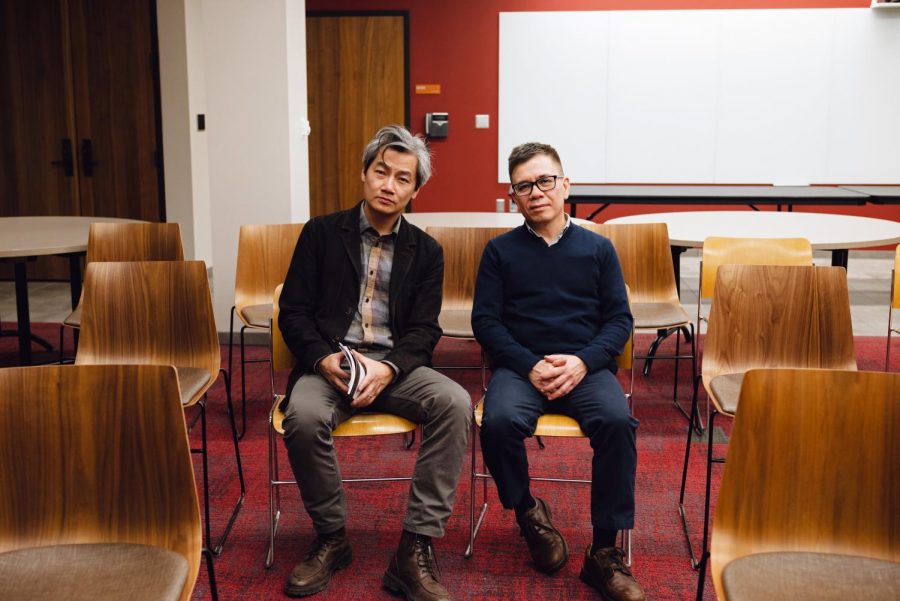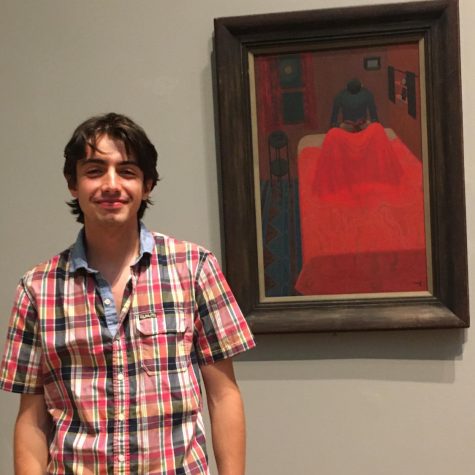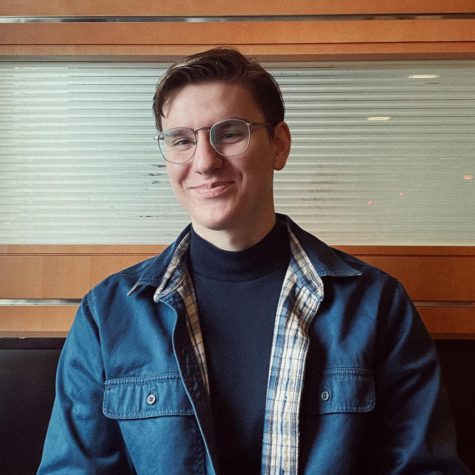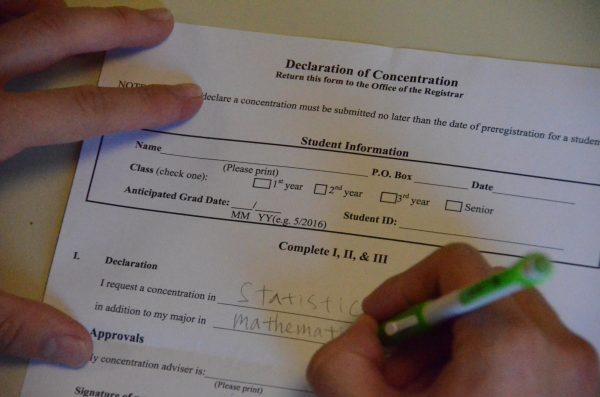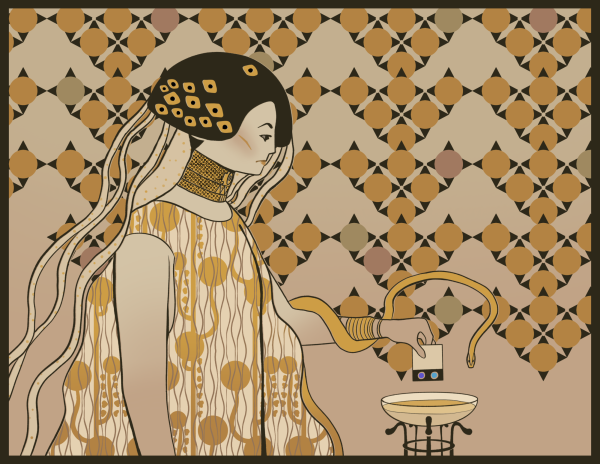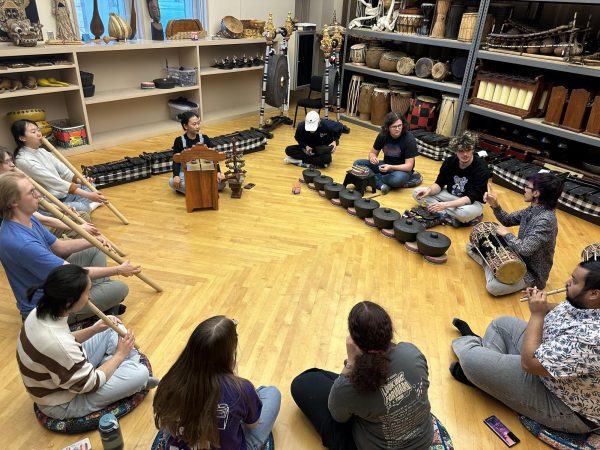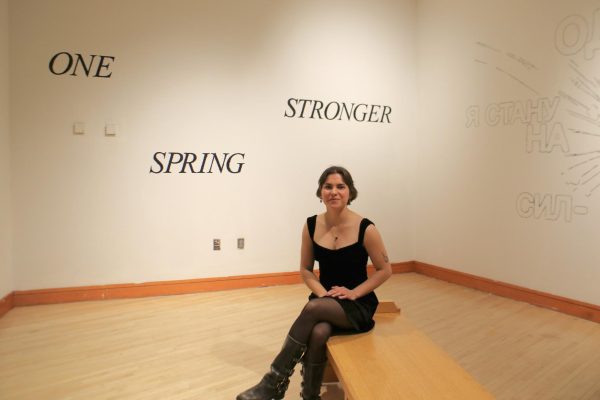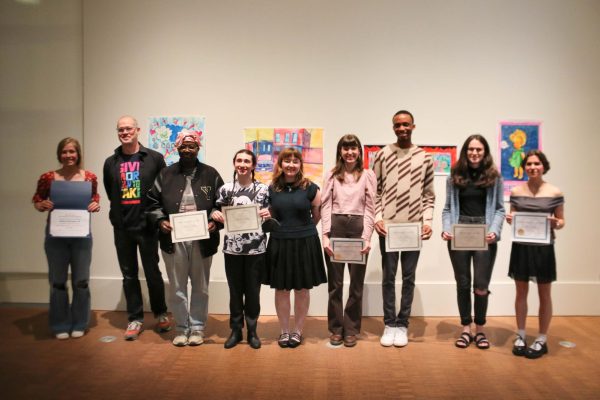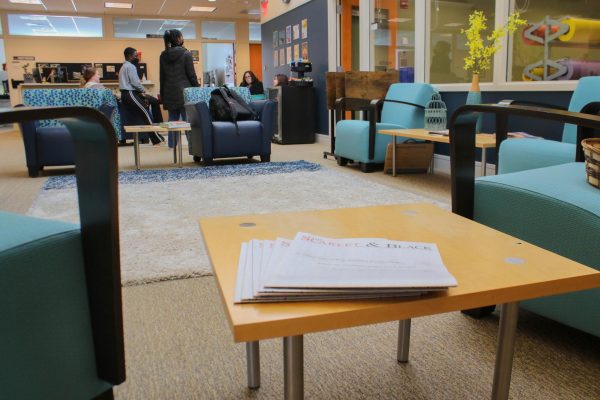A poet in exile: Phan Nhiên Hạo with Hai-Dang Phan at Writers@Grinnell
Phan (left) and Hạo (right) spoke on memory, belonging and disaporic identity in Hạo’s poetry.
March 13, 2023
Phan Nhiên Hạo’s poems are short, sincere bursts of life which in simple language capture precise impressions of incredibly complex feelings and emotions, intimately portraying the history of a country, a man and his journey into exile. During the second Writers@Grinnell event of the spring semester on March 2, Hạo and Hai-Dang Phan, associate professor of English, poet and translator, alternated between English and the original Vietnamese to great effect. They rendered the distance, liminality and echoes of memory contained within each verse before a rapt audience of Grinnell College students in the multipurpose room of the Humanities and Social Studies Center (HSSC).
Since arriving in the United States as a refugee in 1991, Hạo has published several poetry collections in Vietnamese — “Radio Mùa Hè” in “Summer Radio,” 2019, “Chế Tạo Thơ Ca 99-04” in “Manufacturing Poetry,” 2004 and “Thiên Đường Chuông Giấy” in “Paradise of Paper Bells,” 1998. His English-translated poems have appeared in many literary journals and anthologies as well as two books — “Night, Fish and Charlie Parker,” translated by Lin Dinh and published in 2005, and, most recently, “Paper Bells,” translated by Hai-Dang Phan and published in 2020, which was among the 10 books on the 2021 PEN America Literary Awards Longlist for poetry in translation and shortlisted for the American Literary Translators Association’s 2021 Lucien Stryk Asian Translation Prize. He currently lives in Illinois, where he works as an academic librarian at Northern Illinois University.
Hạo was born and raised in Kon Tum, a small city in the Central Highlands region of Vietnam. He was drawn to poetry at a young age, and he described his family’s extensive library of South Vietnamese and translated European literature. “I read a lot as a kid, and I was a very good student in literature,” he said. “I started to write when I was in my teen years, and then I became more serious in college.”
Hạo said that in many ways, the Vietnam War has defined him as a writer. Though he was only a child during the fighting, he still saw the devastation which it inflicted. In his poetry, Hạo examines the trauma of the war’s aftermath, focusing specifically on the hardship wrought upon his family — formerly officials in the deposed South Vietnamese government. “My family life changed dramatically by the time the war ended,” Hạo said. “People like us were punished. After 1975, we lived in hardship, not only us but many in the South. That changed my perspective because I always feel like I am punished, discriminated [against] politically, because of my family background.” This ultimately forced Hạo to leave Vietnam. “I just didn’t see a future there for myself,” he said.
As an immigrant in the United States, writing poetry gave Hạo a voice to express the anguish which he and his family endured, unhindered by government censorship. “Our suffering after the war could not be talked about in Vietnam,” he said. “Only when I was able to get out could I talk and write about that. The impact of the aftermath of the war affected my family and myself tremendously. It shaped the way I look at life. I always have a sense that I need to talk about my story, and I need to talk about the history of the South, which has definitely shaped me as a writer.”
Hạo also incorporates his journey as an immigrant into his poetry, evoking sensations of isolation and loss as well as the immense power — both positive and negative — which memory may wield. “Being a Vietnamese writer in America, I have two important concerns,” he said. “First is my memory about Vietnam, my sense of history, the past and the war, while the other is my life as an immigrant in the United States. I came here and I did all kinds of odd jobs — working as a newspaper delivery person, working as a janitor, working in factories. I went through all the typical experiences that an immigrant has to go through, and that’s also affected my writing.”
Phan stated that Hạo’s poems continue the tradition of poets in exile, residing in a state of liminality, belonging entirely to neither Vietnam nor the U.S. “His writing is a uniquely, worldly kind of global, yet at the same time it’s rooted in a very particular historical, cultural matrix of South Vietnamese living in Vietnam after the war and immigrating to the U.S.,” Phan added.
Ultimately, Hạo views his poetry as a call to remember, reaching out to the nation and people from which he was compelled to flee. “I want to talk to people in Vietnam today, to a younger generation, about the past,” he said. “Children growing up nowadays just read the official narrative of the government. I want to tell my story as an immigrant, as a refugee, as a person coming from the South. I want to provide this perspective to people of Vietnam. I may write in English someday, but I write in Vietnamese because that is the audience I most want to connect with.” Hạo added that online publication has vastly improved his ability to escape censorship, share his work with people in Vietnam and form a global literary community.
Phan, however, noted that Hạo still cannot publish his work in Vietnam due to government restriction. “He is writing into the void, writing with a possibility of no audience,” Phan said. “So each poem itself demands and imagines that there is an audience, and each one contains the preservation and the creation of a voice. I find that very powerful and very humane to claim that you have a voice and a subject position.”
Hạo likened this unique position of his to the metaphor of a paper bell, namesake of one of his poems and title of his most recent English-language collection. “A bell is supposed to be made of bronze, so when you hit it there is sound,” he said. “A paper bell doesn’t make any sound, and that’s the idea. My voice can’t be heard because I write in Vietnamese, because I’m an immigrant and my life is very isolated. The paper bell is a way of saying that I’m a writer who has a bell, but it doesn’t sound because I don’t have an audience here. But even though it’s quiet, it’s still a bell. I just keep writing, even if not many people read my writing.”
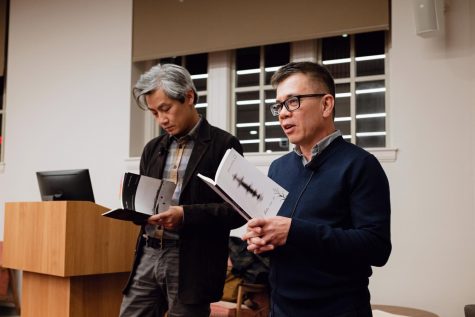
Though Hạo’s primary goal is sharing his voice with Vietnamese readers, he said that he views translation as a critical way to share his message with a larger audience, saying, “because of translation, I’m able to reach a large audience of English language readers who hopefully can find something in common in my writing.”
Speaking on the translation process, Hạo said that he feels lucky to have Phan as a translator. “Translation is never perfect, but Hai Dang is a great writer, and he is very sensitive to my poems,” Hạo said. “His translation is very close to the original, but Hai Dang also has his own voice and his own interpretation of certain images and words in Vietnamese.”
Phan, a distinguished poet in his own right, first encountered Hạo’s poetry through translation as a graduate student at the University of Wisconsin-Madison during the 1990s. “Artistically, I was drawn to the poems because they are heavily image-driven and they have this surrealist impulse that is still truly rooted in reality, which I believe is where their social and political force originates.”
The paper bell is a way of saying that I’m a writer who has a bell, but it doesn’t sound because I don’t have an audience here. But even though it’s quiet, it’s still a bell.
— Phan Nhiên Hạo
Certain parallels also link Hạo and Phan — both were born in the same province of Vietnam, though Phan’s family left the country much earlier than Hạo, settling in Wisconsin, and both are also deeply engaged with the Vietnamese literary community from their homes in the United States. “I think Phan has a great sympathy for my writing and a deep understanding of its context,” Hạo said.
Likewise, Phan stressed the importance of the resonance between his experience and Hạo’s, adding that, “he gave me a kind of memory that wasn’t mine, which is connected to my family and my family’s history.” Just as Hạo sees his poetry as a necessary voice, remembering stories that are too often suppressed, Phan sees his translation as calling attention to incredibly important voices which American audiences often overlook. “Hạo reminded me, and reminds all of us, that there are some really interesting and amazing writers living in the United States who work in different languages, and no one knows about them, so translation can be a way to shine a light on their work and advocate for it,” Phan said.
Speaking on the significance of Hạo’s visit to Grinnell, Phan stated, “it’s a unique opportunity to meet and encounter a Vietnamese diasporic writer, a writer in exile, a writer with a very unique path who reminds us that sometimes being a writer is not just about publishing with the big publishing houses and having agents, or popular books, but maybe it’s just writing and hoping that you’ll find an audience.”
Hạo and Phan continue to collaborate on translation projects, working towards expanding the voice of Vietnamese literature in the United States and globally.
Meanwhile, the Writers@Grinnell series continues with Sandra Lim and Gabrielle Calvocoressi on Tuesday, April 11 with a 4:15 p.m. roundtable discussion in HSSC room S1325 and an 8 p.m. reading in the Joe Rosenfield Center (JRC) room 101.




























































